Zhumanazarova Captures Third Straight Gold at Junior Asian C'ships
Thursday, July 11, 2019 - 14:11 By United World Wrestling Press

CHON BURI, Thailand (July 11) - Meerim ZHUMANAZAROVA (KGZ) made it three gold medals in three attempts at the Junior Asian Championships.
Zhumanazarova, a returning junior world bronze medalist, topped cadet Asian champion Rin MIYAJI (JPN) 8-6 in the finals at 68kg to win her third straight title on the first day of the women's wrestling competition at the Junior Asian Championships in Chon Buri, Thailand.
In the finals, Zhumanazarova found herself down early in the match. Miyaji, a past cadet Asian champion, picked up a takedown 40 seconds into the match. A short time later, Miyaji fired off an attack, which Zhumanazarova countered for a takedown and exposure before the Japanese woman reversed the action and scored two points, giving her a 4-4 criteria lead. Zhumanazarova then retook the lead with an exposure to go ahead 6-4 at the break. She added to her lead in the second period with a takedown to go up 8-4, but Miyaji turned the tables by stepping over and earning two points of her own, which cut the deficit to 8-6. The two wrestlers continued to battle. A late flurry at the end of the match resulted in no points as Zhumanazarova held on to win.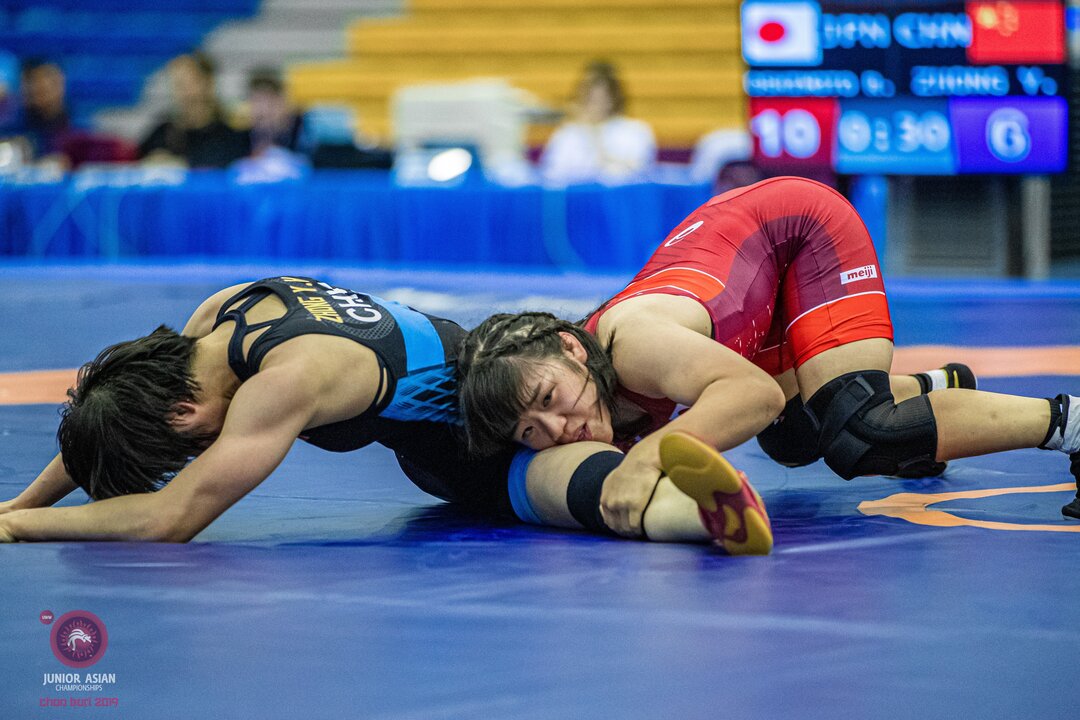 Remina YOSHIMOTO (JPN) claimed the gold medal at 50kg. (Photo: Sachiko Hotaka)
Remina YOSHIMOTO (JPN) claimed the gold medal at 50kg. (Photo: Sachiko Hotaka)
Remina YOSHIMOTO, a 2017 cadet world champion, was the lone gold medalist for returning team champion Japan on Thursday. She claimed a 13-6 victory over Yuhong ZHONG (CHN) in the gold-medal match at 50kg. Yoshimoto led by two points with just over 30 seconds remaining before scoring five points late from two takedowns and a step out to win by seven. 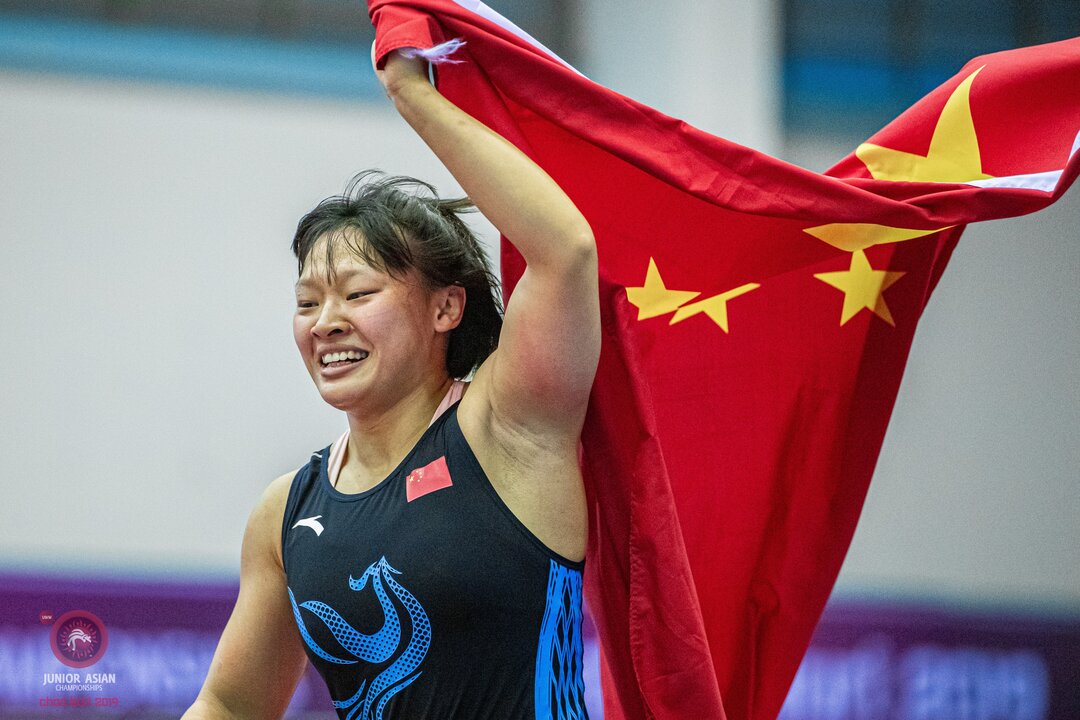 Qian JIANG (CHN) celebrates after winning gold at 76kg. (Photo: Sachiko Hotaka)
Qian JIANG (CHN) celebrates after winning gold at 76kg. (Photo: Sachiko Hotaka)
Cadet world silver medalist Qian JIANG (CHN) made quick work of Shakhribonu ELLIEVA (UZB) in the finals at 76kg. Jiang secured a takedown early in the match off a single leg before transitioning to her leg lace, which she used to turn Ellieva four consecutive times to pick up a 10-0 technical superiority. 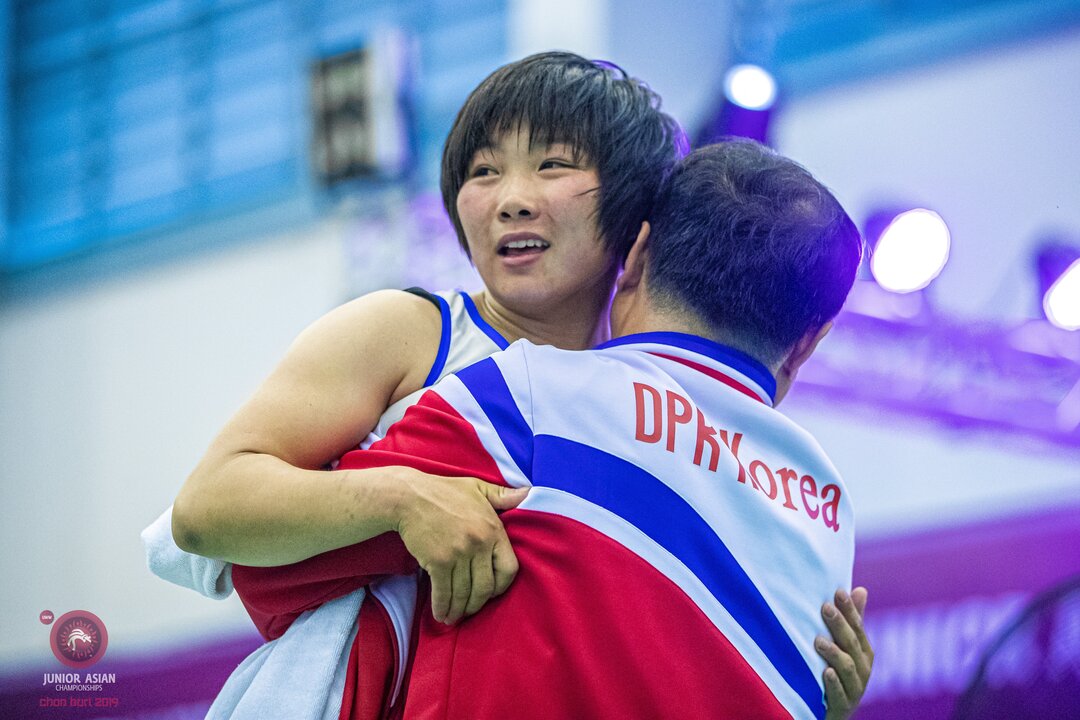 Hyon Ju YUN (PRK) embraces her coach after a 14-4 finals victory. (Photo: Sachiko Hotaka)
Hyon Ju YUN (PRK) embraces her coach after a 14-4 finals victory. (Photo: Sachiko Hotaka)
Hyon Ju YUN (PRK) earned the gold medal at 55kg by defeating Enkhtsetseg BATBAATAR (MGL) 14-4 in the finals. Yun raced out to an early 8-0 lead and appeared to be on her way to a first-period technical superiority, but the Mongolian fought hard and stayed in the match, scoring four points in the final minute of the first period. Yun closed out the match just over a minute into the second period with a takedown and exposure. 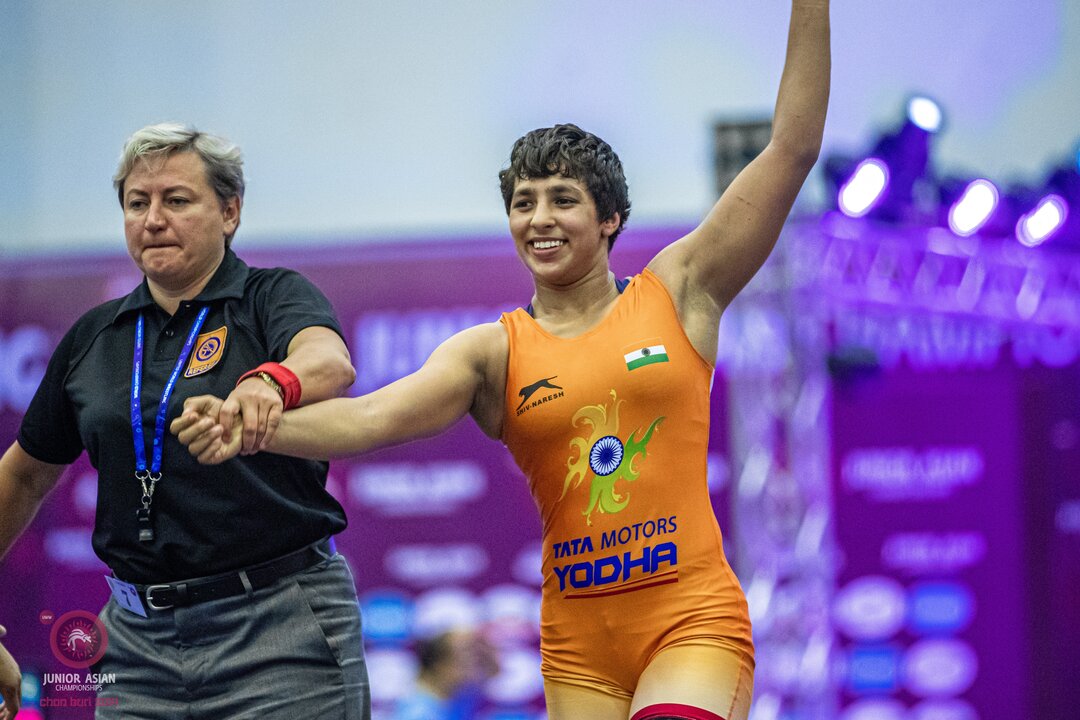 Anshu ANSHU (IND) dominated in the finals. (Photo: Sachiko Hotaka)
Anshu ANSHU (IND) dominated in the finals. (Photo: Sachiko Hotaka)
Anshu ANSHU (IND) won the gold medal in dominant fashion at 59kg, beating Nazira MARSBEK KYZY (KGZ) by 10-0 technical superiority in the finals. Anshu scored her first takedown just 20 seconds into the match. A short time later she used a feet-to-back takedown to build her lead to 6-0. She added two more takedowns to end the match in the first period.
The five remaining women's wrestling weight categories, 53kg, 57kg, 62kg, 65kg and 72kg, will be contested Friday at the Junior Asian Championships, with action set to begin at 10 a.m. local time.
RESULTS
Women's Wrestling
50kg
GOLD - Remina YOSHIMOTO (JPN) df. Yuhong ZHONG (CHN), 13-6
BRONZE - Myonggyong WON (PRK) df. Otgontuya CHINBOLD (MGL), 11-0
BRONZE - Thi Hong CAN (VIE) df. Miran CHEON (KOR), 6-1
55kg
GOLD - Hyon Ju YUN (PRK) df. Enkhtsetseg BATBAATAR (MGL), 14-4
BRONZE - Anju ANJU (IND) df. Aktenge KEUNIMJAEVA (UZB), 3-2
BRONZE - Tsugumi SAKURAI (JPN) df. Sandugash DYUSSENGALIYEVA (KAZ), 10-0
59kg
GOLD - Anshu ANSHU (IND) df. Nazira MARSBEK KYZY (KGZ), 10-0
BRONZE - Zhuomalaga ZHUOMALAGA (CHN) df. Anh Tuyet TRAN (VIE), 9-0
BRONZE - Ayami SUGIYAMA (JPN) df. Khodicha NAJIMOVA (UZB), 10-0
68kg
GOLD - Meerim ZHUMANAZAROVA (KGZ) df. Rin MIYAJI (JPN), 8-6
BRONZE - Kim Ngan PHẠM (VIE) df. Albina KAIRGELDINOVA (KAZ), 6-4
BRONZE - Xin LI (CHN) df. Yarinda AIRLANG (THA), 12-2
76kg
GOLD - Qian JIANG (CHN) df. Shakhribonu ELLIEVA (UZB), 10-0
BRONZE - Mizuki NAGASHIMA (JPN) df. Karuna KARUNA (IND), INJURY

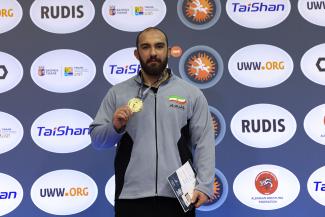
Share your thoughts.
Comments